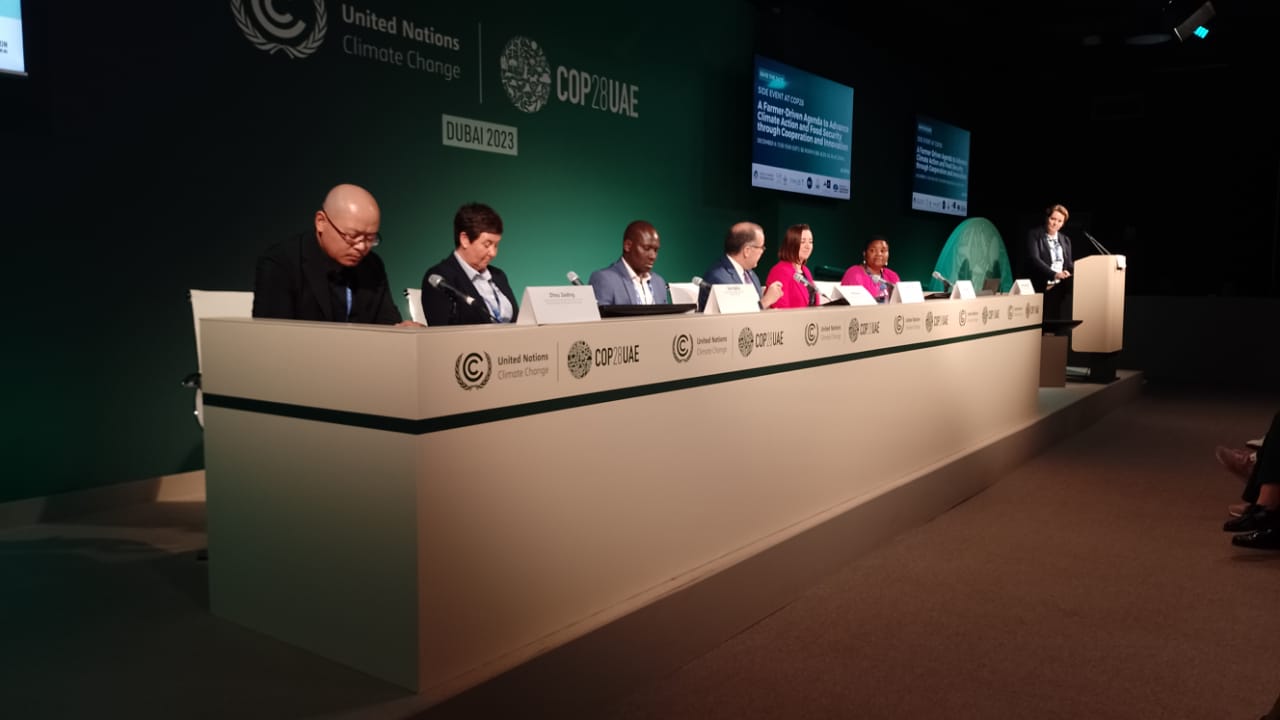Farmers have demonstrated this and reinforced the leading role of agriculture at COP28 – the supreme negotiating and discussion forum on the present and future of global efforts to tackle climate change. COP28, taking place in the United Arab Emirates, has brought together 70,000 global leaders, including heads of State, ministers, senior officials, international organizations, private sector representatives, as well as youth and civil society organizations.

Dubai, United Arab Emirates, 11 December 2023 (IICA) – Even as they struggle to remain resilient and to adapt to the environmental crisis in order to continue producing healthy and nutritious food, farmers are making valuable contributions to global climate change mitigation goals.
Farmers have demonstrated this and reinforced the leading role of agriculture at COP28 – the supreme negotiating and discussion forum on the present and future of global efforts to tackle climate change. COP28, taking place in the United Arab Emirates, has brought together 70,000 global leaders, including heads of State, ministers, senior officials, international organizations, private sector representatives, as well as youth and civil society organizations.
The Inter-American Institute for Cooperation on Agriculture (IICA), along with its 34 Member States and private sector partners in agrifood production, is playing a critical role at the event, which continues until 12 December, as it will host some of the major debates on the sector at its Home of Sustainable Agriculture of the Americas pavilion.
Small farmers and food companies joined IICA in a presentation that sparked keen interest at this latest edition of the United Nations Climate Change Conference in Dubai.
The presentation discussed the leading role of farmers throughout the world in an agenda that combines climate action and food security, in which international cooperation and innovation are also key components.
The presenters included two farmers—Elizabeth Nsimadala, President of the Eastern Africa Farmers Federation and Felix Sum, a Kenyan farmer—along with Emily Rees, President and CEO of Croplife International, a leading organization in agrifood production innovation, as well as Lloyd Day, Deputy Director General of IICA.
Other speakers were Arnold Puech D’Alissac, President of the World Farmers’ Organisation (WFO); Shou Jiading, Program Director in the Shan Shui Conservation Center, an environmental conservation NGO in China; and Sue Ogivily of Farming for the Future, an Australian organization that promotes resilient and low-carbon agriculture.
Saboto Caesar, Minister of Agriculture of St. Vincent and the Grenadines and Francisco Minuche Verdaguer, Deputy Minister of Rural Development of Ecuador attended the event.
Croplife International’s Emily Rees remarked that, “Climate change is a real phenomenon that is already underway and that is changing the conditions under which we have been producing”. She explained that ecosystem deterioration has multiple negative repercussions for food production.
Manuel Otero, Director General of IICA, reflected that, “Farmers are essentially the victims rather than the main perpetrators of climate change. The region’s agrifood sector has made enormous strides in enhancing sustainability in recent years; it is part of the solution to climate change and the mainstay of the planet’s food security”.
Farmers, victims of climate change
“Deforestation, for example, prompts the spread of pests and diseases, as forests are natural barriers”, said Rees. She described farmers as the true agents of change, through the recovery of ecosystems, and pointed out that they face many challenges ahead, but also opportunities, thanks to new technologies that boost resilience and productivity.
“What a welcome sight to see so many farmers playing a leading role at COP28”, reflected Lloyd Day. The IICA Deputy Director General explained that one of the key messages of the agricultural development organization of the Americas is that small, medium- and large-scale farmers must be given a seat at the table when the transformations taking place in the sector are being discussed.
The most vulnerable farmers cannot shoulder the cost of adapting to increasingly extreme weather phenomena that are affecting crops and ways of life”, insisted Day, even as he maintained that farming can reduce its greenhouse gas emissions, restore soils and also guarantee the world’s food security.
Elizabeth Nsimadala spoke on behalf of farmers in Africa – a continent with which IICA has built bridges, given that it recognizes that like the Americas, Africa is key for global food security, rich in natural resources and a region that is being buffeted by the impact of climate change.
The Kenyan farmer said that the major challenge is to ensure that the agrifood sector is integrated into all levels of climate plans, including in the preparation of the Nationally Determined Contributions (NDCs), which are the mitigation and adaptation objectives that each country routinely establishes.
She stressed that, “No one understands agriculture like farmers, but we still are not given the role that we deserve in the discussions. The challenge is to make our voice heard more loudly”.
More information:
Institutional Communication Division.
comunicacion.institucional@iica.int











